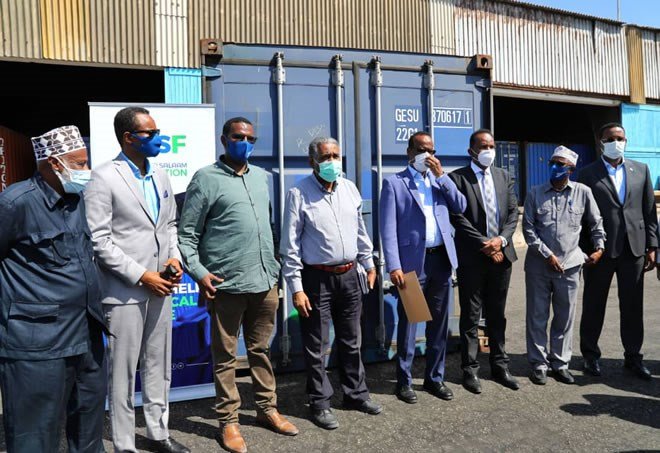As the COVID-19 pandemic ravages across the world posing health and economic crisis, the effect of this pandemic couldn’t be felt any harder than in Somalia, a country where the health sector is severely under-resourced and ill-equipped. The country is reeling from decades of conflict is also facing a severe humanitarian crisis as a result of the desert locust invasion and looming droughts.
As of 06 April 2021, Somalia’s Federal Ministry of Health and Human Services registered a total of 11, 623 confirmed COVID-19 cases, 546 COVID-19-related fatalities and 4, 90106 recoveries from the virus. The tally could be higher than the government’s count considering the resurgence of a deadlier second wave of the virus and the people’s continued negligence to take the health guidelines seriously. Similarly, the majority of deaths in the country go unregistered at health facilities making it difficult to note the exact number of COVID-19-related fatalities. The failure by the public to adhere to the health instructions issued by the Federal Ministry of Health as well as the government’s inability to deal with the situation hugely contributed to the rapid spread of the virus within the communities, with the resurgence of the virus now creating havoc across the country. The number of fatalities, especially among elderly people spiked in the country.
Immediately after the country confirmed the first case of the COVID-19 in mid-March 2020, the federal government of Somalia carried out a raft of measures aimed at controlling the spread of the virus. On 18 March 2020, it had announced to have allocated US $5 million to bolster the efforts to combat the virus. But the amount has not been adequate to address the ruining effect occasioned by the pandemic.
The Federal Government relies on international aid and grants from international countries and organisations to deal with natural disasters and shocks. Shortly after the government announced its plan to fight the Coronavirus disease, the first response came from foreign countries and international NGOs that provided much-needed medical assistance to the country. Diagnostic tools and medical equipment were part of the international effort to help Somalia deal with the virus.
Before that, investigations were being conducted abroad; in South Africa and Kenya, and the results were waited for weeks. Nevertheless, the intervention of foreign governments has boosted Somalia’s ability to address the ramifications inflicted by the pandemic. A similar role has been taken by Somalia’s business community who allocated US $5 million to the fight against the infection.
Hormuud Telecommunication Company, in particular, has spent over USD 2.5 million in the fight against COVID-19 and in response to pleas from the federal government to the private sector to play their role in curbing the spread of the pandemic. The amount donated by Hormuud was exactly half of the US $5 million funds spent by the Somali business communities in the COVID-19 response efforts.
“During a pandemic, we all have an obligation, and that why Hormuud Telecom and Salaam Somali Bank have donated US $2,500,000 to respond to the spread of the COVID-19 pandemic,” said the Head of the Telecom’s Salaam Foundation, Abdullahi Osman.
During the current wave of the virus, Hormuud has intensified its strife to fight the disease. The telecom has donated a total of 2,500 oxygen cylinders to the De Martino Hospital, the main health facility in the capital that is treating patients with the virus. Each cylinder costs Hormuud US $50, according to Abdullahi Osman. Hormuud’s donations are not only limited to oxygen cylinder distribution but are also aiming to realize the dream of building the first oxygen factory in the country to address the alarming need for oxygen cylinders for patients with respiratory and breathing difficulties. The telecom has also contributed to fundraisings aimed at purchasing assorted medicine and PPEs for the brave health workers attending to the COVID-19 patients.
Citizens do not have the means and resources to prevent or control COVID-19. Furthermore, the survivors of the virus still undergo major threats which include political violence and security threats. As a result, it has become increasingly difficult for Somalia to control the virus. However, the Federal Government of Somalia has closed the learning institutions and reduced the number of its employees while the country’s largest commercial areas are still open such as markets and supermarkets, restaurants, public places, public transport especially Mogadishu. The Federal Government of Somalia has at first ordered the closure of all commercial places but the Somali people did not heed the orders and rather continued with their businesses as the government did not subsidize them.
Special treatment and quarantine centres had to be set up, and initially, the idea was seen as a viable option to prevent the spread of the Virus. This move was successful at first when the numbers of Coronavirus-infected people were registered at the quarantine centers. This move has changed a lot in 2021, following the resurgence of the Coronavirus in Somalia.
As soon as the first case of COVID-19 was reported in Somalia, the Federal Government of Somalia has equipped the De Martino Hospital which had previously been rebuilt. “We hope to make De Martino Hospital a special place to treat Covid19 patients,” said the former Prime Minister Hassan Ali Khaire at the time.
To complement, the government’s efforts to respond to the pandemic, Hormuud Telecom, through Hormuud-Salaam Foundation has in April 2020 also donated to build four wards in Banadir Hospital in Mogadishu.
“I would like to express my deepest gratitude to Hormuud Telecom for the reconstruction of four wards in Banadir Hospital,” said Dr. Fawzia Abikar Nur, Somali Minister of Health. The center is equipped with two ambulances and it was aimed to accommodate as a quarantine center and treatment for COVID-19 patients.
































